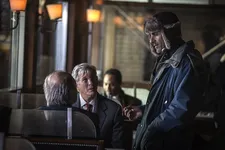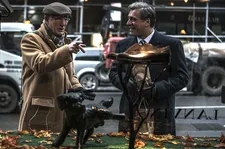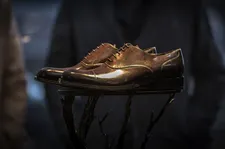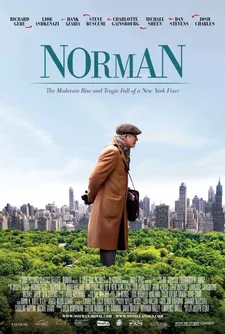 |
| Brooklyn Diner - Norman's (Richard Gere) tip to Jo Wilf (Harris Yulin): "That meeting happens here." Photo: Anne-Katrin Titze |
Richard Gere and Lior Ashkenazi give Oscar caliber performances in Joseph Cedar's Sony Pictures Classics and Tadmor Entertainment's Norman: The Moderate Rise And Tragic Fall Of A New York Fixer, with a very strong supporting cast that includes Harris Yulin, Hank Azaria, Charlotte Gainsbourg, Dan Stevens, Michael Sheen, Steve Buscemi, Josh Charles, and Isaach De Bankolé.
 |
| Joseph Cedar: "Luxury in general, at least from my point of view, has to come with a certain kind of wink." Photo: Anne-Katrin Titze |
On Sunday morning, the director of the Oscar-nominated Footnote (Hearat Shulayim) met with me at the Brooklyn Diner, one of the locations used in his latest film. We discussed his production designers Kalina Ivanov and Arad Sawat, costume designers Ann Roth and Michelle Matland, Harvey Weinstein and Otto Preminger's Exodus, Stanley Kubrick, Lion Feuchtwanger and Veit Harlan, being dressed by Alber Elbaz for the Oscar red carpet, the Cohen silent films, shooting in New York, defining luxury, and what is and is not a fairy tale.
At an oil and gas energy conference, Norman Oppenheimer (Gere) notices one of the speakers, Micha Eshel (Ashkenazi) and follows him on the streets of Manhattan. He sees in him a future, a connection, who knows. In front of the Lanvin shop window, he pounces. A pivotal scene early on, involving De Bankolé as the salesperson, results in the purchase of a very expensive pair of shoes. A few years later, Eshel has become Prime Minister of Israel. He remembers Norman, the stranger who bought him shoes and the entire world will be affected by the consequences.
Norman is a man on a mission. What exactly that mission is, nobody really knows - possibly Norman himself least of all. It has to do with success, dignity, survival, connectedness, lies and human warmth. He is the stranger you chat with, who tells you that he knows the person you have to meet and that he will make it happen. Norman's home is nowhere, he is a wanderer in a camel-colored topcoat, but the world does not belong to him. Far from being an abstraction, he is all too real, yet he still yearns for confirmation of his existence.
 |
| Harris Yulin and Richard Gere with Joseph Cedar at the Brooklyn Diner |
Anne-Katrin Titze: You have great locations in Norman - and they are not random at all. They look carefully chosen.
Joseph Cedar: Shooting in New York forces you to. You have to really, really want a location. Because for every one specific place you have twenty other options - many of them would be cheaper. So you have to convince everyone that it's worth it. Otherwise, this diner could have been anywhere.
AKT: Which scenes take place here in the Brooklyn Diner?
JC: There is a scene near the beginning of the film. Norman is standing out that window and he is stalking Dan Stevens, the Bill Kavish character, sitting there and he is surprised to see him. The reason he is sitting here is because he is Jo Wilf's assistant. Jo Wilf played by Harris Yulin, who at the end of the film is sitting here with Norman.
Norman is telling him that the Prime Minister is off the hook and his character knows how to turn that into a speculative bet on the market. So he makes a lot of money. That meeting happens here.
 |
| Norman (Richard Gere) with Micha Eshel (Lior Ashkenazi) at Lanvin shop window: "So combining these $1200 shoes with the piss of a dog …" |
AKT: Let's start with the shoes, the Lanvin shoes. It all begins really in front of the shop window. The shop window of Lanvin has a dog lifting its leg at a tree with the shoes on top. Was that the actual Lanvin decoration or did you design it?
JC: We designed it. Kind of like the locations in New York, when you design a shop window, you have to somehow justify it. It could have been any design. The one we chose has a story. It's not really important to the audience but it had to be important to us. Have you seen Lanvin shop windows?
AKT: I have. I am actually wearing a Lanvin jacket for you today.
JC: Okay, I wouldn't have known.
AKT: That's good.
JC: I have an interesting relationship with Alber Elbaz who is no longer there [at Lanvin].
 |
| Joseph Cedar on Lanvin and the Oscars: "I have an interesting relationship with Alber Elbaz who is no longer there." |
AKT: I know, yes. He is a great designer.
JC: I corresponded with him recently but I didn't ask him where he is headed.
AKT: He was still at Lanvin when you were shooting Norman?
JC: Yes, otherwise we wouldn't have been able to do it. So there are two things. Just in general, the Lanvin concept or his concept was always combining high and low, I think. Sneakers with high fashion. Expensive sneakers. Or - dignified and clownish. Which I think is very much Alber. I like what it does because it puts a pin in a balloon.
Luxury in general, at least from my point of view, has to come with a certain kind of wink. When you take luxury seriously, it's fascist. Luxury is a part of our life, it's a way to generate money. It's also kind of a religion, if you think about it. The world of luxury functions because you're willing to pay a lot of money for something that has no purpose. The less purpose it has and the more money you're willing to pay for it, the more gratifying it is. That's the effect of luxury.
There's something specifically about Lanvin that constantly reminds you; this thing that you're willing to pay thousands of dollars for is nonsense and still it becomes valuable. Kind of like art. It becomes interesting because you're willing to do that.
 |
| Bill Kavish (Dan Stevens), Jo Wilf (Harris Yulin), Rabbi Blumenthal (Steve Buscemi): "Well, every fairy tale has a ball." |
So, shoes separate you from the ground. That's why we wear shoes. So combining these $1200 shoes with the piss of a dog, which is the filth of the ground, which is what you're separating, is the idea of luxury. So we put that in a frame and at least I'm happy it's there, even if no one else cares.
AKT: It's beautiful. I loved it because it made me wonder. It does have the spirit of Lanvin and of your movie.
JC: I mean, they had to approve it. I should give credit to our two production designers, Kalina Ivanov and Arad Sawat. When you have this challenge of designing something that is already very designed - a Lanvin store is all about design - so you have to be close to the reality and yet give it its own flavor that's unique for the story. And that's what they did. Alber gave me a pair of shoes once.
AKT: There's an autobiographical element in it a little bit?
JC: No. Because what happened with those shoes is the opposite of what happened to these shoes. For the last Oscars that I attended [for Footnote], I had met him [Alber] and I enjoyed talking to him. He offered me a tuxedo, he offered to dress me for the Oscars like he would any of the actresses. Which of course was strange because no one cares about me.
 |
| Micha Eshel on the shoes given to him by Norman: "I must be returning that gift by just accepting it. That's the way he thinks. Which is why he is a politician and we are not!" |
But I care about me. So that was nice for me. So I came to his store in L. A. and I had three people dress me up in a beautiful tuxedo with a purple bow tie, like Alber has, which is great. And these shoes that I would never buy, of course, but I probably wouldn't ever wear. Do you like shoes?
AKT: Yes, I like shoes. We can do a whole feature just on shoes.
JC: Okay. I don't know if you know those, but they weren't shiny and they slightly went up at the edge, kind of clownish. Anyway, I put them on and I thought they were funny. Okay, what the hell, I'll wear them. As I was doing this, I was looking at the prices. And everything that was put on me was really, really expensive. The prices [in Norman] are the real prices. Anyway, I went to the Oscars, that was very nice.
A few days after, it [the suit] was just hanging in my closet. I didn't think I would ever wear it again but I didn't really want to give it back either. And I didn't know if it was mine or not. The last time someone gave me something he told me "you don't have to give it back." But I asked. Here, I didn't know if I should or should not ask, but I did. And they said, "Yes, bring it back. We'll send a delivery to pick it up." And immediately, I felt bad. Even though I would never wear it again, I didn't want to give it back.
AKT: I understand perfectly.
 |
| Sunday morning, April 9 at the Brooklyn Diner on West 57th Street Photo: Anne-Katrin Titze |
JC: I think I wanted them to tell me "You can keep it." And when they didn't … I think I did the right thing. But I didn't have to do the right thing!
AKT: Sometimes you feel bad for doing the right thing. It makes you feel stupid.
JC: That's exactly it.
AKT: I once moved into an apartment in Paris where I found money under the carpet. I immediately went to the woman who had rented the place before me and told her that I had found her money.
JC: But you didn't know that it's hers?
AKT: No. Your story made me think of this. Seeing her face made me think it wasn't.
JC: But she took it.
AKT: She took it and said "oh, thanks."
JC: But you did the right thing. Because if you had taken that money, you would have felt a little bit sour because you don't know if someone was looking for it.
 |
| On Eshel's relationship with Norman: "When a stranger gives you a very expensive gift, there's something a little wrong about that. He doesn't feel bad." |
AKT: I felt a bit stupid, though. Back to the shoes.
JC: I felt that it's probably worth losing the shoes but gaining the feeling that you did the right thing.
AKT: And gaining the film scene!
JC: The film scene is the opposite because the person in the film taking the shoes [Micha Eshel played by Lior Ashkenazi] doesn't have that. He doesn't mind. It's not completely wrong. It's not that bad. Someone gave you a gift. But when a stranger gives you a very expensive gift, there's something a little wrong about that. He doesn't feel bad. He convinces himself that it's okay.
Because if someone is giving me a gift, there must be a reason why he wants to give me a gift. I must be returning that gift by just accepting it. That's the way he thinks. Which is why he is a politician and we are not!
AKT: Yeah, right! Isaach De Bankolé is important in this scene. He is adding another layer. His character is working in the store but his eyes tell another story. He is a witness.
JC: There's this thing some films are able to do. I don't know if I was able to. It's something I hoped would exist. You can allow a character to be a little unrealistic with a lot of pathos and hope that it's somehow convincing and a little fairy-tale-like. Isaach, in my mind, had that quality. He was both a salesperson in Lanvin, it feels like it's the kind of person you would meet there.
 |
| Norman US poster |
But he was also the person who is the catalyst for this very important event that is happening for the whole world in this shoe store. He had to have this mysterious aura to him. That's what we played with. I'm not 100% sure it works. We tried to give it this magical taste.
AKT: You say fairy tale. Twice I took note of scenes that reminded me of a fairy tale. One was when Norman and Eshel meet again and everything stops for a second and becomes slow-motion. Sleeping Beauty pricks her finger and the entire court stops and falls asleep. Time stands still.
JC: Well, every fairy tale has a ball.
AKT: That's their ball?
JC: Yes, I think so. Fairy tale is not exactly the word. There's a silent film sensibility. They don't feel real. It's closer to theater than to realistic portrayal of an actual situation. There's a series of silent films. It's a character named Cohen. The series was made in 1904, I think. Between 1902 and 1907. Cohen is a merchant who cheats people and then ultimately becomes a victim of his schemes. Most of the films happen either right outside the storefront outside the window or inside the store.
They were shot in New York, the first films shot on location ever. It's a New York Jewish man who is grotesque. He has a big nose. Let me show you. [He shows me a film clip on his phone]. The character is so grotesque, he's almost dressed up like a clown and you can see the origins of The Tramp in there. It feels like there's something about the medium of film that likes this kind of character - someone who is funny because he digs his own grave.
All the bad things that happen to him, happen because of him. But at heart he's a good person and he doesn't deserve the kind of punishment he is getting. It's as if there were audiences that needed that, needed to dislike a person, realize that he is very close to who we are and then forgive him. That's where this story comes from. It's not real but it's not a fairy tale.
Coming up - Joseph Cedar explains what's in a name, talks Richard Gere's performance, working with costume designers Ann Roth and Michelle Matland, Charlotte Gainsbourg's character, Harvey Weinstein and Otto Preminger's Exodus, Lion Feuchtwanger's Jud Süß and Veit Harlan screenplay, and Stanley Kubrick.
Norman: The Moderate Rise and Tragic Fall of a New York Fixer opens in the US on April 14.





















